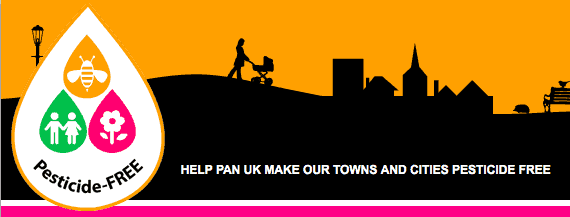Greenhouse Pioneer: Keith Tyrell, PAN UK

For the last six years, Keith Tyrell has been instrumental in the fight against pesticides as the Director of PAN (Pesticides Action Network) UK. Established over twenty years ago, PAN UK is the only UK charity focused on tackling the problems caused by pesticides and promoting sustainable alternatives for use in agriculture, urban areas, homes and gardens.
Tell us, in 20 words or fewer, about PAN – what’s your mission?
We work to protect people and planet from pesticides: to end the use of hazardous pesticides and replace them with more sustainable alternatives.
What motivates you?
Every year hundreds of thousands of people die from acute pesticide poisoning; many millions more suffer from debilitating chronic illnesses as a result of pesticide exposure. Water is polluted and wildlife populations from bees to birds have been decimated. The saddest thing is that most pesticide use is ineffective because of overuse and lack of training. It’s also unnecessary as plenty of viable non-chemical alternatives are available. I am driven to get the message out that there is another way of feeding the planet that does not poison farmers, their families or trash the environment.
What is your greatest achievement to date?
We have helped secure global bans on some of the most toxic pesticides such as Endosulfan and Lindane saving countless lives. But our work to promote alternatives has also changed lives – PAN UK was an early pioneer of organic cotton: 20 years ago, we demonstrated that it offers a viable livelihood for smallholder farmers and since then, we have trained tens of thousands of farmers, lifting them out of poverty, ending poisoning and dramatically cutting pollution.
What are the challenges you face?
The agrochemical industry is a powerful and wealthy opponent. Last year, just four pesticide companies spent nearly 10 million Euros lobbying the EU, and this pattern is repeated all over the world. It is difficult for us to compete and put across the other side of the story, even though we have the evidence that non-chemical approaches work and are better for the environment and human health.
What are you working on at the moment that’s getting you fired up and excited?
Hundreds of towns and cities all over the world have stopped using pesticides in parks and open spaces. Last year, we launched our own campaign to get UK towns to go pesticide-free and we have supported dozens of local campaigns to ask their Councils to end the use of pesticides in public places like parks and schools. A handful of towns like Glastonbury, Brighton and Wadebridge have already started to cut pesticide use and experiment with non-chemical alternatives. It’s really taking off and we are confident that many more UK towns will join them in 2017.

Where do you want to take PAN next?
Brexit is a real threat, but also a huge opportunity: we now have the chance to end subsidies for polluting practices and switch to supporting more sustainable forms of agriculture. We will be pushing for a new model for UK farming, and we will be fighting to make sure that environmental controls and safeguards are not watered down once we leave the EU.
What can we, as individuals, do to make a difference?
Buy organic is the first step, but if you want to get more involved, grow your own organic food or start your own pesticide-free towns campaign.
If you were Prime Minister/President for a day, what would be the first thing you’d do?
I’d transform UK agriculture by promoting agroecological approaches and helping farmers to switch away from pesticides. Simply banning pesticides is not enough. We also need to help farmers to adjust and put serious money into research to develop effective non-chemical pest controls.
What’s the coolest project or product you’ve come across?
I recently met some Dutch researchers who have developed an app to help smallholder cotton farmers get advice on how to control pests. Information and extension support in the developing world is patchy and poor quality. This app helps them to identify pest problems and gives practical advice on how to control them. Everyone has mobile phones in the developing world, so it’s a great way of getting this information where it’s needed.
Can you recommend a life or game-changing book for our readers?
My favourite book of all time is Walden by Henry David Thoreau. It’s nearly 200 years old, but still relevant and inspiring. Thoreau’s vision is the opposite of consumerism, and all about working together in harmony with the environment.
What do you listen to when you’re cooking dinner?
I love country music: Steve Earle, Emmylou Harris, and Patti Griffin. Something upbeat and with attitude always gives my cooking a lift!
What’s the best advice you’ve ever been given?
Stop thinking and start doing.
Can you leave us with who’d be your Eco Hero?
My eco-hero was hugely influential on UK and EU environmental policy, but largely unknown outside those circles. He was an environmental journalist called Marek Mayer – a fearless investigator who uncovered the truth and present facts. Marek believed in evidence-based policy making and he debunked myths and the propaganda from vested interests. He died tragically young. I dread to think what he would think of today’s “Post Truth” news where facts come second to the story – I miss him.
We’ve interviewed other agricultural and farming pioneers such as Sara Venn from Incredible Edible, Catherine Fookes from the Organic Trade Board, Craig Sams from Carbon Gold and Guy Watson from Riverford. To discover our other pioneer interviews head over to our blog.


